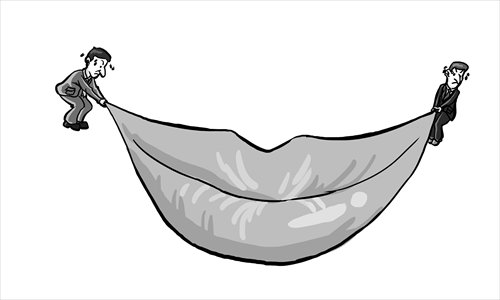Politicians' smiles worth as much as word

Forget about the Mona Lisa. Now the most talked-about smile in China is that of Yang Dacai, an official in charge of safety supervision in Shaanxi Province.
The smile on the face of a middle-aged, slightly plump provincial official would not normally be an issue, but then he flashed it at the scene of a road accident that killed 36 people and it was captured on camera.
When the snapshot was uploaded on the Internet, it immediately dragged Yang into political turmoil. First he was criticized for a lack of sympathy toward the victims. Then netizens discovered he owns as many as 11 luxury watches, whose prices should be out of reach for him. He is now under investigation for possible corruption. And all of this happened in only a few days.
While Chinese politicians may have learned in the recent weeks that the wrong facial expressions at the wrong times and in the wrong locations can destroy just about everything they have worked so hard to get, American politicians have been showing that the right facial expressions displayed impeccably at the right times and the right locations can be suffocating. At least, that's how I felt while I was watching the Republican and Democratic national conventions one after another over the past two weeks.
Held once every four years, the conventions mean to pull the voters closer to the presidential nominees and the star politicians of the two parties by showing they are real people like us.
But if the rehearsed speeches have shown the true colors of the politicians, I must be color blind. All I see are strictly trained gestures, accurately timed facial expressions, personal stories calibrated carefully, and a lot of painstaking work to deceive viewers into thinking this is effortless.
The emotions displayed on the podium and even a large part of the speeches seem to be interchangeable between the Democrats and the Republicans, although the only thing they agree on is that the US can be great provided you don't vote for the other guys.
But keeping the right expression is critical for politicians.
Photographers are lurking everywhere and waiting for the perfect embarrassing moment. Political journalists and opponents are always ready to zoom in the secrets leaked by an unplanned smirk or frown. And before you know it, the expression can play a big role in voters' decisions.
As Theresa DiDonato, assistant professor of psychology of Loyola University Maryland, pointed out in Inquisitive Mind magazine, "We now know that in the instant we see a person's face, an array of fast and implicit cognitive processes take place. In that split second, we unconsciously construct ideas about a person's personality. [...] As you might imagine, because we make these personality inferences so easily, they can have important implications for a political candidate seeking election."
The voters apparently don't like dull poker faces. That might be partly the reason that John Kerry lost the 2004 election and that Mitt Romney's campaign is worried about his stiff smile. And the voters like to see honesty and sincerity. So that's the expression most politicians are good at.
You could see it on the face of former US president Bill Clinton when he said he did not have sex with his intern, on the face of former US president George W. Bush when he said the war against Iraq was all about weapons of mass destruction, and on the face of Paul Ryan, the Republican vice presidential nominee, when he blamed US President Barack Obama for vetoing a bill that Ryan helped kill himself.
"The face can be a valuable source for the lie catcher, because it can lie and tell the truth and often does both at the same time," wrote psychologist Paul Ekman in his 1985 book Telling Lies.
But isn't that why most of us cannot tell whether a politician is lying or telling the truth, given their enigmatic faces?
The official in China who smiled at the wrong time may have plenty of time on his hands to practice facial muscle exercises like a Western politician. It may be too late for him, though.
The author is a New York-based journalist. rong_xiaoqing@hotmail.com